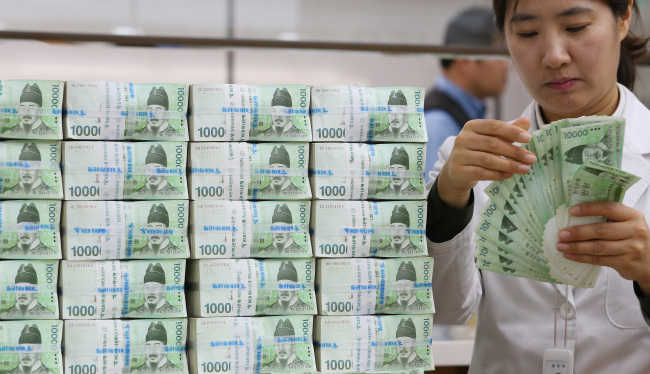BOK takes stance against Korean QE
No extra budget for corporate bailouts, finance minister says
By 원호정Published : April 29, 2016 - 17:45
A high-ranking official at the Bank of Korea said Friday that social consensus is needed for the central bank to pump money into policy banks, voicing caution on President Park Geun-hye-backed “Korean-style quantitative easing” proposal.
“If policy banks need injection of capital to support corporate restructuring, that is primarily a fiscal policy issue, (not a monetary policy one),” said Yoon Myun-shik, assistant governor during a press briefing.
“For the central bank to exercise its money-issuing power to do what should be addressed by a fiscal policy, social consensus is a prerequisite,” he said.
“If policy banks need injection of capital to support corporate restructuring, that is primarily a fiscal policy issue, (not a monetary policy one),” said Yoon Myun-shik, assistant governor during a press briefing.
“For the central bank to exercise its money-issuing power to do what should be addressed by a fiscal policy, social consensus is a prerequisite,” he said.

The remarks came as Korea’s economic policymakers and politicians debate how to recapitalize Korea Development Bank and Export-Import Bank of Korea, as default risks rise among local shipping lines and shipbuilders industries. The latest to succumb to piles of debt, Hanjin Shipping earlier this week asked KDB and other creditor banks for debt restructuring.
Having the BOK provide the liquidity to KDB through bond purchases or direct capital injection is the centerpiece of the so-called Korean QE, a campaign pledge of the ruling Saenuri Party in recent parliamentary elections.
President Park this week revived the proposal, which lost ground on the party’s election defeat, saying she wants to give it “positive consideration.”
Under the current law, the BOK is not allowed to buy bonds issued by KDB or make capital investment in the policy bank.
Opposition parties oppose the idea, saying the government is not out of policy tools to support corporate restructuring to toss the burden to the central bank.
Finance Minister Yoo Il-ho, however, ruled out the possibility of drawing a supplementary budget for policy bank recapitalization.
“I think corporate restructuring alone won’t warrant a supplementary budget, unless it leads to a very bad shock on the economy,” he told reporters Friday. “To draw an extra budget, we have to give the parliament reasons why it is needed, but right now (the issue of corporate restructuring) doesn’t seem to be a sufficient reason.”
Adding that he is studying other ways of shoring up policy-bank capital, the minister stressed tapping into taxpayers’ money for corporate restructuring should be the last resort.
KDB and Korea Eximbank, the two main policy banks, together have nearly 20 trillion won ($17.4 billion) in outstanding loans to shipping lines and shipbuilders, according to the banks.
Nonperforming loans at KDB and Korea Eximbank amounted to a combined 11.4 trillion won at the end of last year, up 118 percent from a year earlier. KDB’s BIS capital adequacy ratio stood at around 14 percent, while Korea Eximbank’s was slightly below 10 percent last year.
Last week before the resurfacing of the Korean QE debate, BOK Gov. Lee Ju-yeol voiced his opposition to the proposed bond purchase program, saying the KDB appears to have no difficulty in raising capital from the market.
The BOK has held the base interest rate at a record-low 1.5 percent for the 10th consecutive month.
By Lee Sun-young (milaya@heraldcorp.com)








![[KH Explains] No more 'Michael' at Kakao Games](http://res.heraldm.com/phpwas/restmb_idxmake.php?idx=644&simg=/content/image/2024/04/28/20240428050183_0.jpg&u=20240428180321)

![[Weekender] How DDP emerged as an icon of Seoul](http://res.heraldm.com/phpwas/restmb_idxmake.php?idx=644&simg=/content/image/2024/04/25/20240425050915_0.jpg&u=)







![[Herald Interview] Mistakes turn into blessings in street performance, director says](http://res.heraldm.com/phpwas/restmb_idxmake.php?idx=652&simg=/content/image/2024/04/28/20240428050150_0.jpg&u=20240428174656)
